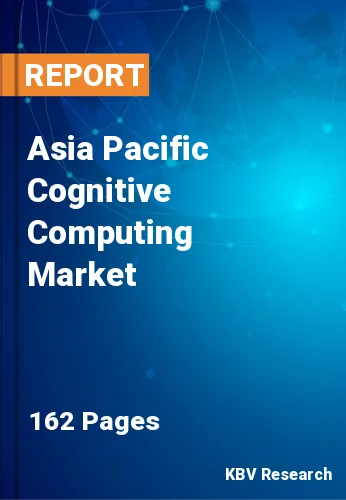The Asia Pacific Cognitive Computing Market would witness market growth of 33.2% CAGR during the forecast period (2023-2030).
The enterprise's production levels are unintentionally increased by cognitive computing's assistance in processing large amounts of complex data. Most data received is unstructured and includes pictures, videos, spoken language, and symbols. Cognitive computing translates unstructured data to perceive, infer, and forecast the optimal answer using various technologies, including automated reasoning, machine learning, and natural language processing.
Additionally, cognitive computing is widely utilized in the BFSI, healthcare, energy & electricity, retail, e-commerce, and other sectors. The market is driven by growth in unstructured data volume and technological improvements. The usage of digital technologies also enhances data management and analytics while giving businesses a better understanding of their product line. In comparison to novice users, advanced users saw nearly twice as much improvement in consumer involvement and their capacity to react sooner to market demands.
Users can also use cognitive technology to help create new teaching resources and specially designed programs for pupils, staff members, and clients. Advanced users have twice the chance of achieving these results than their beginning counterparts. As the usage of cognitive technologies matures, growth-oriented outcomes, such as extending their ecosystem or expanding their firm into new markets, may become more critical.
The usage of cloud computing in the Asia Pacific region has been growing rapidly, driven by a combination of factors that make cloud technology particularly attractive to businesses and organizations in this region. Many countries in the APAC region are actively pursuing digital transformation strategies to modernize their economies and industries. Digitalization has provided the data and technological infrastructure necessary for the growth and development of cognitive computing. Cognitive systems are increasingly being integrated into various aspects of our digital lives, revolutionizing industries, and decision-making processes by leveraging the wealth of digital information available. As digitalization continues to evolve, so will the capabilities and applications of cognitive computing in this region.
The China market dominated the Asia Pacific Cognitive Computing Market, By Country in 2022, and would continue to be a dominant market till 2030; thereby, achieving a market value of $21,576.6 million by 2030. The Japan market is estimated to witness a CAGR of 32.3% during (2023 - 2030). Additionally, The India market would showcase a CAGR of 34% during (2023 - 2030).
Based on Deployment Type, the market is segmented into On-premise and Cloud. Based on Technology, the market is segmented into Natural Language Processing (NLP), Machine Learning and Automated Reasoning & Others. Based on Enterprise Size, the market is segmented into Large Enterprises and Small & Medium-sized Enterprises. Based on Vertical, the market is segmented into Healthcare, BFSI, Retail & E-commerce, Manufacturing, IT & Telecom, Government & Defense, Energy & Power and Others. Based on countries, the market is segmented into China, Japan, India, South Korea, Singapore, Malaysia, and Rest of Asia Pacific.
Free Valuable Insights: The Worldwide Cognitive Computing Market is Projected to reach USD 278.8 Billion by 2030, at a CAGR of 32.3%
The market research report covers the analysis of key stake holders of the market. Key companies profiled in the report include SAP SE, Google LLC, Tibco Software Inc., 3M Company, Microsoft Corporation, SAS Institute Inc., TATA Consultancy Services Limited, IBM Corporation, Hewlett Packard Enterprise Development LP, and Oracle Corporation.
By Deployment Type
By Technology
By Enterprise Size
By Vertical
By Country
Our team of dedicated experts can provide you with attractive expansion opportunities for your business.

